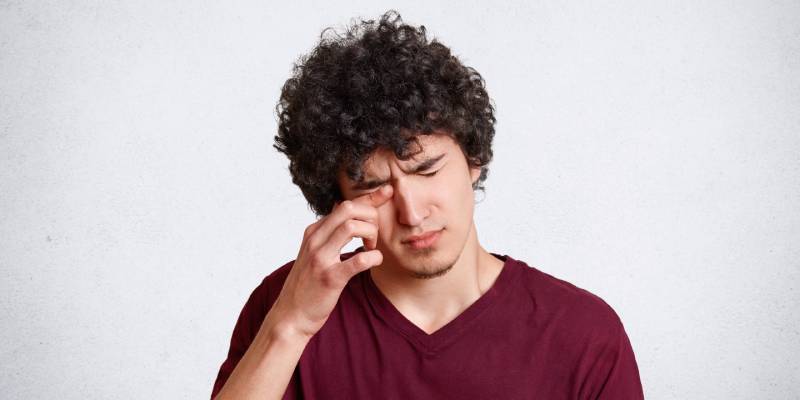
Dry eyes can be a persistent and uncomfortable condition affecting people of all ages. The discomfort, irritation, and blurred vision associated with dry eyes can significantly impact one’s quality of life.
While conventional treatments are available, many individuals are seeking alternative and holistic options to alleviate this condition. In this article, we will explore Ayurvedic treatment options for relief from dry eyes.
What is Dry Eyes?
Dry eyes, medically known as “Keratoconjunctivitis Sicca,” is a common eye condition characterized by an insufficient quantity or poor quality of tears to lubricate and nourish the eye’s surface.
Tears play a crucial role in maintaining the health and comfort of the eyes. They provide a smooth and clear surface for vision, protect against infections, and nourish the cornea—the clear, outermost layer of the eye.
Causes of Dry Eyes

Identifying the underlying cause is crucial for effective dry eye management.
This discomforting condition can result from various factors, including:
- Aging: Tear production tends to decrease as we age, making older individuals more prone to the issue.
- Environmental Factors: Dry climates, indoor heating or air conditioning, wind, and smoke exposure can all contribute to dry eye symptoms.
- Extended Screen Time: Prolonged use of digital devices can reduce blink frequency, leading to dryness.
- Contact Lens Wear: Improper use or extended wear of contact lenses can disrupt the tear film.
- Medical Conditions: Autoimmune diseases, hormonal changes, diabetes, and certain medications can affect tear production.
- Eye Surgery: Some eye surgeries, like LASIK, can temporarily cause the issue.
- Blepharitis: Eyelid inflammation can hinder the production of essential tear components.
- Allergies: Allergic reactions can lead to eye irritation and dryness.
Symptoms of Dry Eyes
Symptoms of dry eyes can range from mild to severe and may include:
- Dryness: A persistent sensation of dryness or grittiness in the eyes.
- Burning: A burning or stinging sensation, particularly in windy or dry environments.
- Redness: Bloodshot eyes due to irritation.
- Excessive Tearing: Paradoxically, some individuals may experience excessive tearing as the eyes attempt to compensate for dryness.
- Blurry Vision: Vision may become temporarily blurred, especially during activities that require focused vision, such as reading or using a computer.
- Sensitivity to Light: Increased sensitivity to light, known as photophobia.
- Discomfort with Contact Lenses: Contact lens wearers may experience increased discomfort, and lenses may not stay in place properly.
Different Types of Dry Eyes According to Ayurveda
In Ayurveda, dry eyes are classified into different types based on the underlying dosha imbalance and associated symptoms.
Understanding these types can help determine the most effective Ayurvedic Treatments For Dry Eyes.
Vata-Type Dry Eyes
- Symptoms: Dryness, sensitivity to light, pain, and a feeling of grittiness.
- Cause: Imbalance in the Vata dosha, which governs movement and dryness in the body.
- Treatment: Nourishing eye drops, warm ghee massage, and a Vata-pacifying diet.
Pitta-Type Dry Eyes
- Symptoms: Burning sensation, redness, inflammation, and photosensitivity.
- Cause: Excess Pitta dosha, leading to heat and inflammation in the eyes.
- Treatment: Cooling eye drops, Triphala eye wash, and a Pitta-balancing diet.
Kapha-Type Dry Eyes
- Symptoms: Heaviness, excessive tearing, and a feeling of mucus in the eyes.
- Cause: Kapha dosha imbalance, resulting in excess moisture and congestion.
- Treatment: Warm compresses, Triphala eye wash, and a Kapha-balancing diet.
Ayurvedic Treatment for Dry Eyes

Ayurveda focuses on balancing the body’s doshas (Vata, Pitta, and Kapha) to maintain overall health. When it comes to treating dry eyes, Ayurveda employs a multifaceted approach.
Nourishing Eye Drops
Ayurvedic treatment for dry eyes often begins with the use of Ayurvedic eye drops, or “Netra Tarpana,” made from natural ingredients like ghee and medicinal herbs. These drops help lubricate the eyes, reducing dryness and discomfort. Regular application of these eye drops can provide long-lasting relief.
Amla (Indian Gooseberry)
Amla is rich in vitamin C and antioxidants, making it a valuable component in natural remedies for dry eyes. Consuming amla or applying amla-infused oil can enhance eye health. Amla’s anti-inflammatory properties can reduce eye redness and irritation.
Triphala Eye Wash
Triphala is a mixture of three fruits: amla, haritaki, and bibhitaki. An eye wash prepared with Triphala powder can alleviate eye dryness and inflammation. It helps cleanse the eyes and maintain their moisture balance.
Ghee Massage
Massaging the eyelids with pure ghee helps improve blood circulation around the eyes, providing relief from dryness. Ghee also nourishes the delicate skin around the eyes, reducing the appearance of fine lines and wrinkles.
Proper Diet
Ayurveda emphasizes a diet rich in foods like carrots, spinach, and almonds, which are known to promote eye health. Including these foods in your daily meals can provide essential vitamins and nutrients for maintaining tear film balance.
Eat
- Carrots: Rich in beta-carotene, carrots promote eye health and may alleviate dryness.
- Spinach: High in vitamins A and C, spinach supports overall eye health.
- Almonds: A good source of vitamin E, almonds can help maintain eye moisture.
- Fatty Fish: Omega-3 fatty acids in fish like salmon and trout contribute to tear production.
- Amla: Incorporating Indian gooseberry (amla) into your diet can boost eye health.
Don’t Eat
- Excessive caffeine: Too much caffeine can lead to dehydration, which can worsen the problem.
- Sugary foods and drinks: High sugar intake may exacerbate inflammation and eye discomfort.
- Processed foods: These often contain trans fats that can harm eye health.
- Excessive spicy foods: Spicy foods can sometimes aggravate dry eye symptoms.
Ayurvedic Lifestyle Recommendations

Reduce Screen Time
Excessive screen time can exacerbate dry eye symptoms. Ayurveda suggests limiting screen exposure and taking breaks to relax the eyes. The 20-20-20 rule, where you take a 20-second break to look at something 20 feet away every 20 minutes of screen time, can be beneficial.
Stay Hydrated
Adequate water intake is crucial for maintaining tear film balance. Ayurveda recommends sipping warm water throughout the day. Staying hydrated helps in the production of tears that keep your eyes moist.
Protect Your Eyes from Environmental Factors
Shield your eyes from harsh winds, dust, and direct sunlight. Wearing sunglasses and using artificial tears when necessary can help protect your eyes from external irritants.
Conclusion
Ayurveda offers a holistic approach to relieving dry eyes by addressing the root causes and providing Ayurvedic treatment for dry eyes. By incorporating Ayurvedic practices into your daily routine and seeking professional guidance, you can find significant and lasting relief from the discomfort of the problem.
FAQs
Can Ayurvedic treatments and natural remedies completely cure dry eyes?
Ayurvedic treatments and natural remedies For Dry Eyes can provide significant relief, and in many cases, they can effectively manage the condition. The extent of improvement varies from person to person. It is essential to consult an Ayurvedic practitioner for personalized treatment.
How often should I use Ayurvedic eye drops?
The frequency of using Ayurvedic eye drops depends on the severity of your dry eye condition. In most cases, using them once or twice a day is recommended. Consult with an Ayurvedic expert for a tailored treatment plan.
Are there any side effects of Ayurvedic eye treatments?
Ayurvedic treatments are generally safe and free from side effects when used as directed. However, it’s essential to use quality products and follow recommended guidelines.
Can Ayurveda help with chronic dry eye syndrome?
Ayurveda can offer relief for chronic dry eye syndrome, but long-term management may be necessary. Consult with an Ayurvedic practitioner for ongoing care and guidance on managing chronic problems.
Are Ayurvedic Natural Remedies For Dry Eyes a suitable option for children?
Ayurvedic Natural Remedies can be suitable for children, but it’s crucial to consult with a healthcare professional to ensure safe and effective treatment tailored to a child’s unique needs.




